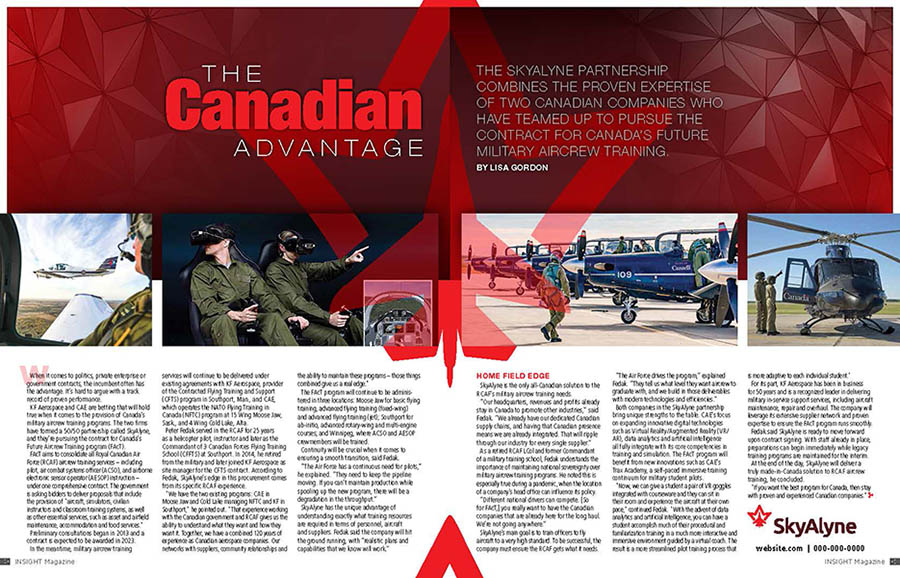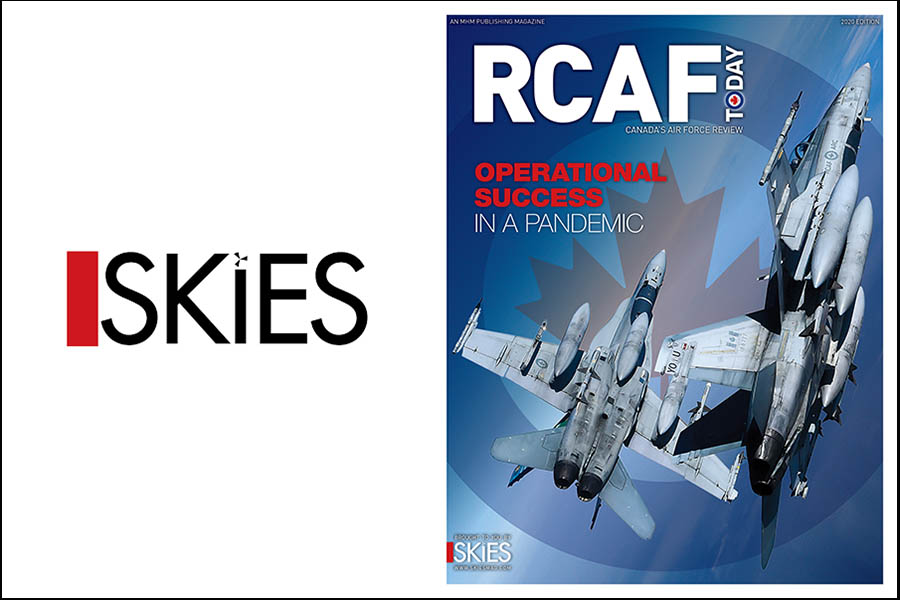by Lisa Gordon
When it comes to politics, private enterprise or government contracts, the incumbent often has the advantage. It’s hard to argue with a track record of proven performance.
KF Aerospace and CAE are betting that will hold true when it comes to the provision of Canada’s military aircrew training programs. The two firms have formed a 50/50 partnership called SkyAlyne, and they’re pursuing the contract for Canada’s Future Aircrew Training program (FAcT).
FAcT aims to consolidate all Royal Canadian Air Force (RCAF) aircrew training services – including pilot, air combat systems officer (ACSO), and airborne electronic sensor operator (AESOP) instruction – under one comprehensive contract. The government is asking bidders to deliver proposals that include the provision of “aircraft, simulators, civilian instructors and classroom training systems, as well as other essential services, such as asset and airfield maintenance, accommodation and food services.” Preliminary consultations began in 2013 and a contract is expected to be awarded in 2023.

In the meantime, military aircrew training services will continue to be delivered under existing agreements with KF Aerospace, provider of the Contracted Flying Training and Support (CFTS) program in Southport, Man., and CAE, which operates the NATO Flying Training in Canada (NFTC) program at 15 Wing Moose Jaw, Sask., and 4 Wing Cold Lake, Alta.
Peter Fedak served in the RCAF for 25 years as a helicopter pilot, instructor and later as the Commandant of 3 Canadian Forces Flying Training School (CFFTS) at Southport. In 2014, he retired from the military and later joined KF Aerospace as site manager for the CFTS contract. According to Fedak, SkyAlyne’s edge in this procurement comes from its specific RCAF experience.
“We have the two existing programs: CAE in Moose Jaw and Cold Lake managing NFTC and KF in Southport,” he pointed out. “That experience working with the Canadian government and RCAF gives us the ability to understand what they want and how they want it. Together, we have a combined 120 years of experience as Canadian aerospace companies. Our networks with suppliers, community relationships and the ability to maintain these programs – those things combined give us a real edge.”
The FAcT program will continue to be administered in three locations: Moose Jaw for basic flying training, advanced flying training (fixed-wing) and advanced flying training (jet); Southport for ab-initio, advanced rotary-wing and multi-engine courses; and Winnipeg, where ACSO and AESOP crewmembers will be trained.
Continuity will be crucial when it comes to ensuring a smooth transition, said Fedak.
“The Air Force has a continuous need for pilots,” he explained. “They need to keep the pipeline moving. If you can’t maintain production while spooling up the new program, there will be degradation in the throughput.”
SkyAlyne has the unique advantage of understanding exactly what training resources are required in terms of personnel, aircraft and suppliers. Fedak said the company will hit the ground running, with “realistic plans and capabilities that we know will work.”
HOME FIELD EDGE
SkyAlyne is the only all-Canadian solution to the RCAF’s military aircrew training needs.
“Our headquarters, revenues and profits already stay in Canada to promote other industries,” said Fedak. “We already have our dedicated Canadian supply chains, and having that Canadian presence means we are already integrated. That will ripple through our industry for every single supplier.”
As a retired RCAF LCol and former Commandant of a military training school, Fedak understands the importance of maintaining national sovereignty over military aircrew training programs. He noted this is especially true during a pandemic, when the location of a company’s head office can influence its policy. “Different national drivers can compete. [So for FAcT,] you really want to have the Canadian companies that are already here for the long haul. We’re not going anywhere.”
SkyAlyne’s main goal is to train officers to fly aircraft to a very high standard. To be successful, the company must ensure the RCAF gets what it needs.
“The Air Force drives the program,” explained Fedak. “They tell us what level they want aircrew to graduate with, and we build in those deliverables with modern technologies and efficiencies.” Both companies in the SkyAlyne partnership bring unique strengths to the table. CAE’s focus on expanding innovative digital technologies such as Virtual Reality/Augmented Reality (VR/ AR), data analytics and artificial intelligence all fully integrate with its core competencies in training and simulation. The FAcT program will benefit from new innovations such as CAE’s Trax Academy, a self-paced immersive training continuum for military student pilots.
“Now, we can give a student a pair of VR goggles integrated with courseware and they can sit in their room and experience the aircraft at their own pace,” continued Fedak. “With the advent of data analytics and artificial intelligence, you can have a student accomplish much of their procedural and familiarization training in a much more interactive and immersive environment guided by a virtual coach. The result is a more streamlined pilot training process that is more adaptive to each individual student.”
For its part, KF Aerospace has been in business for 50 years and is a recognized leader in delivering military in-service support services, including aircraft maintenance, repair and overhaul. The company will leverage its extensive supplier network and proven expertise to ensure the FAcT program runs smoothly. Fedak said SkyAlyne is ready to move forward upon contract signing. With staff already in place, preparations can begin immediately while legacy training programs are maintained for the interim. At the end of the day, SkyAlyne will deliver a truly made-in-Canada solution to RCAF aircrew training, he concluded.
“If you want the best program for Canada, then stay with proven and experienced Canadian companies.”
***
This sponsored article appeared in SKIES Magazine’s 2020 edition of RCAF Today.




